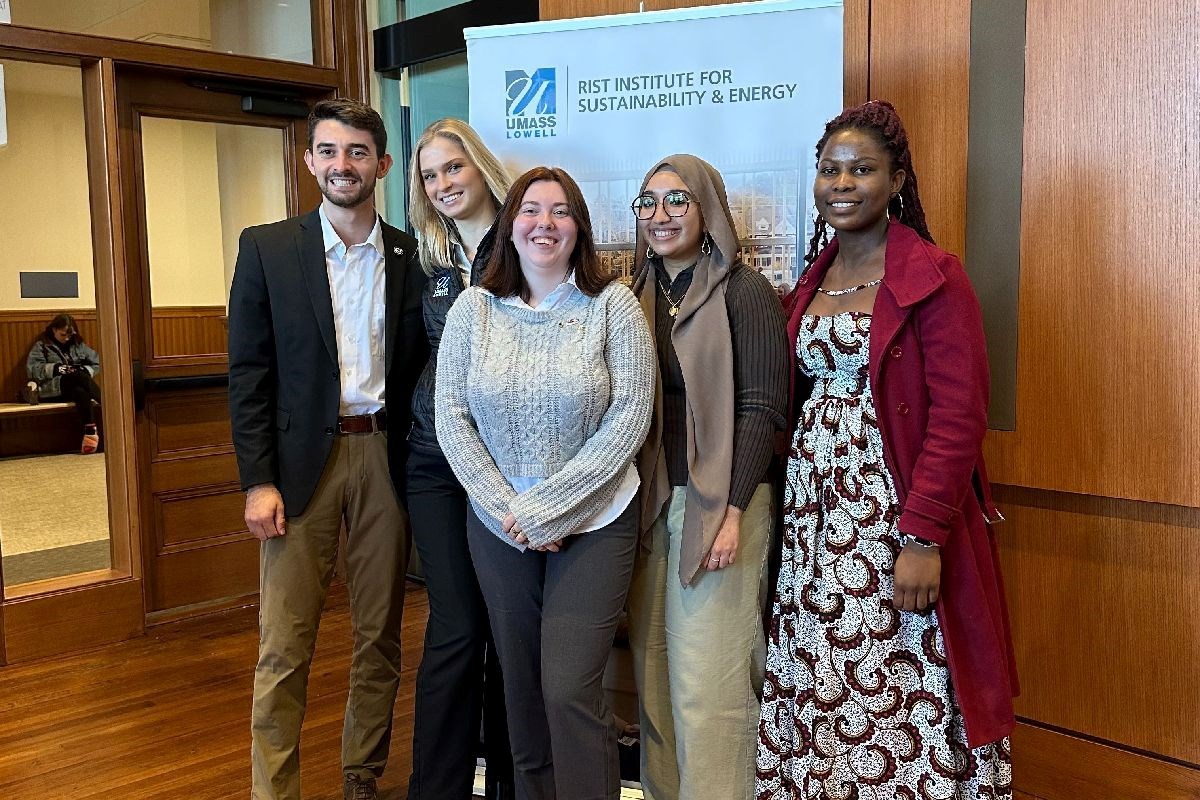
11/27/2023
Boston Globe
By William Lefebvre and Victoria Wisniewski
UMass Lowell students, William Lefebvre and Victoria Wisniewski, investigate how the consequences of industrial expansion and a lack of environmental regulations from past generations has consequences for Gen Z. As both students are part of the Gen Z cohort, they seek to express their concerns about climate change at this year's COP28.
The climate change challenge has largely fallen to us, caused by prior generations through a lack of environmental regulations and industrial expansion, leading to an exponential increase in greenhouse gas emissions.
As a small, multidisciplinary group of students at the University of Massachusetts Lowell, we are the only public institution in Massachusetts with a seat at COP28, the annual United Nations climate conference. We are in Dubai to represent our college and our state – and our generation’s future.
While honored to attend such an event, we have our work cut out for us. We are tasked with bringing back critical information to help Massachusetts implement policies that will create a more sustainable future and continue to be a leader in climate policy. Meeting with world leaders, nongovernmental organizations, innovators, and activists will enable us to assemble information to share with state and local policy makers in hopes of making influential change.
We recognize that the next phase of climate mitigation and adaptation won’t be easy. Massachusetts policy makers have only scratched the surface in exploring and implementing policy options, such as banning the purchase and sale of gasoline-powered cars by 2035. However, the next stages of climate policies need to focus on more expansive efforts to address climate equity, community engagement, and transformation of our existing built environment to help reduce carbon emissions. The Commonwealth has initiated its transition away from fossil fuels by helping to develop a major offshore windfarm that’s expected to power about 400,000 homes. Now Massachusetts must work toward even more impactful change for future generations.
Our group is part of Generation Z, and we recognize the burden of taking meaningful action to mitigate the climate crisis. That challenge has largely fallen to us, caused by prior generations through a lack of environmental regulations and industrial expansion, leading to an exponential increase in greenhouse gas emissions. While daunting, it is critical that our generation, along with the ones to follow, learn from the previous mismanagement of our planet. Our devotion to help mitigate the climate crisis through expansion of climate science and communication is fostering hope that is in short supply.
One of the largest challenges we face is global mobilization to reverse anthropogenic effects on our climate. The climate crisis is a global issue that affects all of us, and cannot be solved by one state or country alone. Massive action, similar to the achievement of the 1987 Montreal Protocol, a global effort to address the continued depletion of the ozone layer, is necessary for the safety and advancement of our future.
Attending COP28 will enable us to learn best practices from countries around the world on their initiatives regarding the climate crisis and help us realize our commitment to equity by gaining a global perspective on the challenges faced by other cultures. Having the ability to collaborate with people from across the globe will teach us different ways to address climate justice and how we can apply those lessons in Massachusetts to address climate equity. This can be achieved by including those are affected the most by the effects of climate change but who contribute the least to its causes. We want to ensure that underrepresented communities such as those in Lowell are seen, heard, and their needs are addressed as new climate policies are drafted.
In addition to climate and environmental justice, the challenge of transforming the built environment cannot be overlooked. With most people living in cities and much of the Commonwealth already densely developed it is imperative to recognize that the built environment is integral to addressing the climate crisis. Cities like Lowell and Boston need to enact sustainable urban policies, allocate funding to redevelopment, retrofit buildings to be more energy efficient, electrify heating, shift to public and active transit, and more. Understanding how other countries are successfully implementing making these changes will help members of our group delegation share ideas that can be executed back home.
Addressing the climate crisis for a secure and livable future is possible despite the despair and mistrust of leaders that many members of Gen Z share. With our presence at COP28, the opportunity to connect and collaborate with groups around the world – and share our perspectives as heirs to previous generation’s failed climate policies – can help drive significant change.
As the next generation of leaders, we are well-positioned to address the climate crisis in Massachusetts. We’ve gained a strong foundation in climate change science and the scale of action needed to address it. That foundation will enable us to appreciate and learn more about today’s best ideas for climate action at COP28 to implement at the local level. We represent young voices ready to advocate, educate, and drive meaningful change in our own communities and, in doing so, contribute to Massachusetts’ efforts to lead on climate crisis mitigation.
It's up to us to take the initiative, and this is only the beginning.
William Lefebvre is a junior and an eco representative and Victoria Wisniewski is an environmental science graduate student at the Rist Institute for Sustainability and Energy at the University of Massachusetts Lowell.
